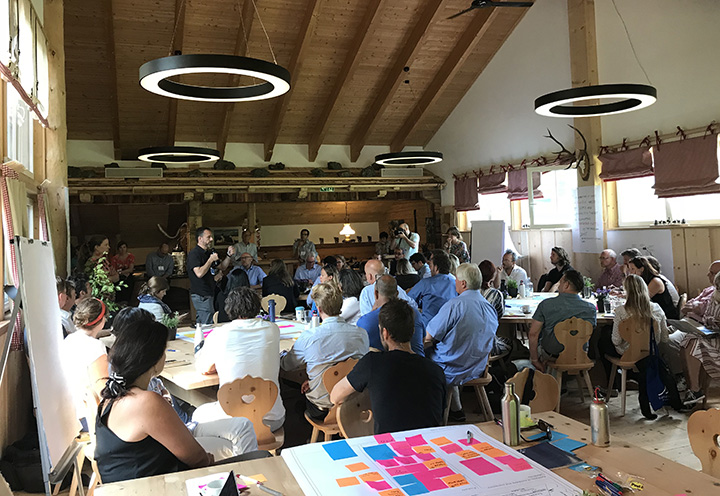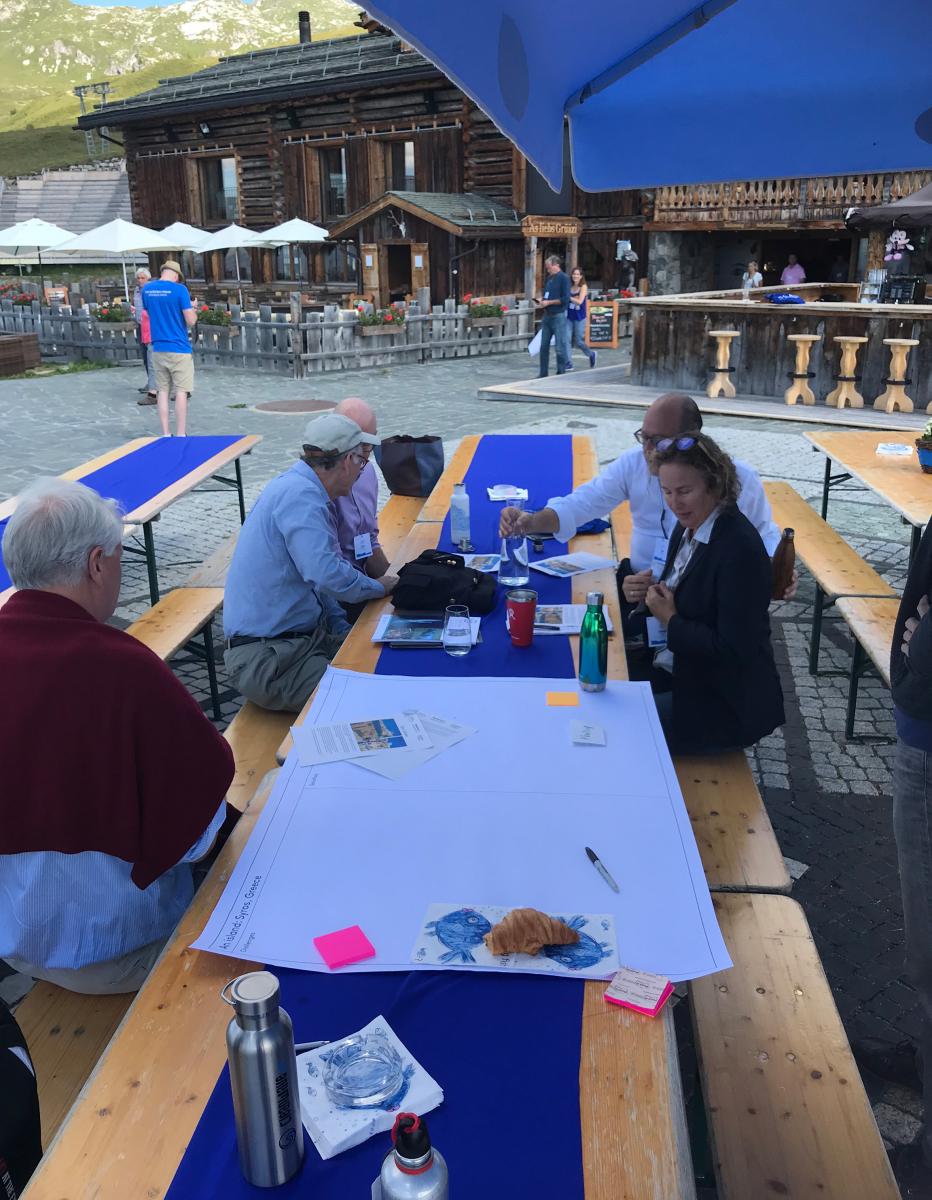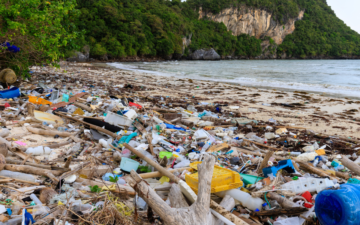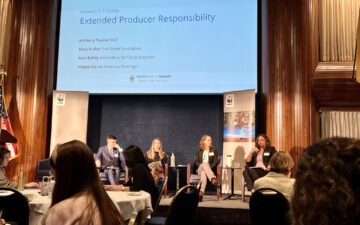In July, I spent four days at The Klosters Forum, an intimate small-town setting in the Swiss Alps that fosters more innovative collaborations by bringing together disruptive and inspirational minds to tackle some of the world’s most pressing environmental challenges. Klosters’ welcoming hosts, the clear mountain air and the produce and cheese from the artisanal farm meeting site are designed to enable thoughtful and neutral conversations among expert participants.
This year, seventy of us gathered to talk about the future of plastic in our world, especially as to how we can reduce the harm from plastic pollution to the ocean. This gathering included experts from grassroots organizations and university chemistry departments and from industry and law. There were determined anti-plastic campaigners and passionate individuals thinking creatively about how to deal with plastic trash in the poorest countries in the world.
We spent half our time on what, and half on how. How do we deal with a problem that is both contributed to by most of humanity, and potentially harmful to all of humanity?

Like most of us, I thought I had a pretty good handle on the scope of the problem of plastic pollution in our ocean. I thought I understood the challenge of addressing it and the consequences of continuing to allow millions of pounds of trash to blow, drift, or drop into the ocean. I understood that The Ocean Foundation’s role might best be to continue to support some of the excellent existing options, provide evaluation, strive to go plastics free, and identify where there may be gaps that could be filled by dedicated individuals around the world.
But after a week of talking with experts on ocean plastic pollution, my thinking has evolved from that of support, of analysis, and of referral of good projects for funding to our assemblage of donors to the need to add a new element to the effort. We not only need to reduce plastic waste–we need to reduce our dependence on plastics overall.

Plastic is an amazing substance. The diverse array of polymers allow for an astonishing breadth of uses from prosthetic limbs to automobile and airplane parts to lightweight single use cups, straws, and bags. We asked chemists to come up with substances that were durable, suited to a specific use, and lightweight for reduced shipping costs. And the chemists responded. In my lifetime, we’ve shifted from glass and paper to plastic for almost all group gatherings—so much so that at a recent gathering to watch environmental films, someone asked me what we would be drinking out of if not plastic cups. I mildly suggested that glasses for wine and water might work. “Glass breaks. Paper gets soggy,” she responded. A recent New York Times article illustrated the consequences of the chemists’ success:
1
Among the takeaways from the Klosters meeting for me are a better understanding of just how huge the challenge we face is. For example, individual polymers may be both officially food safe and technically recyclable. But we don’t have the actual recycling capacity for those polymers in most places (and in some cases anywhere at all). Furthermore, researchers and industry representatives who were at the meeting raised the issue that when polymers are combined to address multiple food issues at once (breathability and freshness in lettuce, for example), there tends to be no additional assessment of either the food safety or recyclability of the combination. Or of how polymer blends respond to prolonged exposure to sunlight and water—both fresh and salty. And all polymers are very good at transporting toxins and releasing them. And of course, there is the additional threat that because plastics are made from oil and gas, they will emit greenhouse gases over time.
One major challenge is how much of the plastic produced and thrown away in my lifetime is still out there in our soil, in our rivers and lakes, and in the ocean. Stopping the flow of plastic into the rivers and the sea is urgent—even as we continue to explore feasible, cost-effective ways of removing plastic from the ocean without causing additional harm we need to end our reliance on plastics altogether.

Starved Laysan Albatross chick, Flickr/Duncan
One Klosters discussion focused on whether we need to rank the value of individual plastic uses and tax or ban them accordingly. For example, single use plastics for use in hospital settings and in high risk situations (cholera outbreaks, for example) might receive different treatment than party cups, plastic bags, and straws. Communities would be offered options for tailoring the structure to their specific needs—knowing that they need to balance their costs for managing solid waste versus the cost of enforcing the bans. A coastal town might focus on bans to reduce the cost of beach clean-up outright and another community might focus on fees that reduce use and provide funding for clean up or restoration purposes.
The legislative strategy—however it might be structured—needs to include both incentives for better waste management and the development of appropriate technologies to improve recyclability at realistic scales. It means regulating the production of plastics of many kinds and providing incentives to develop ever more recyclable and reusable polymers. And, getting these legislative limits and incentives in place soon is critical because the industry is planning to quadruple worldwide production of plastic over the next 30 years (right when we need to be using much less that we do today).
With the many challenges in mind, I remain particularly interested in furthering the development of a legislative tool kit, which can be used in combination with The Ocean Foundation’s experience with legislative peer-to-peer outreach on ocean acidification at the state level in the USA, and at the national level internationally.
I will note it is going to be hard work to get any plastic pollution legislation ideas right. We are going to require a serious technical background and will need find ideas that get at the root cause of the problem, instead of those that are window dressing, to be successful. In other words, we are going to have to work to avoid falling prey to people with big and wonderful sounding ideas that have serious limitations or to solutions that look and feel good that do not get us where we want to be such as Boyan Slat’s “Ocean Cleanup Project.”

Obviously, we at The Ocean Foundation are not the first to think in terms of a legislative strategy and the development of a legislative tool kit. Likewise, there are an increasing number of organizations who have worked with decision makers to develop appropriate regulatory strategies. For a more comprehensive policy toolkit, I would like to collect successful exemplars from the municipal and state level, as well as some national laws (Rwanda, Tanzania, Kenya, and Tamil Nadu come to mind as recent examples). I would like to work with colleagues from ClientEarth, members of the Plastic Pollution Coalition, and the industry who have identified successful strategies. With the groundwork laid at this year’s Klosters Forum, next year’s Forum can focus on policy, and legislative solutions to the problem of plastics in our ocean.
Mark J. Spalding, President of The Ocean Foundation is a member of the Ocean Studies Board of the National Academies of Sciences, Engineering, and Medicine. He is serving on the Sargasso Sea Commission. Mark is a Senior Fellow at the Center for the Blue Economy, at the Middlebury Institute of International Studies. In addition, he serves as the CEO and President of SeaWeb, is the advisor to the Rockefeller Ocean Strategy (an unprecedented ocean-centric investment fund) and designed the first-ever blue carbon offset program, SeaGrass Grow.
1Lim, Xiaozhi “Designing the Death of a Plastic” New York Times 6 August 2018 https://www.nytimes.com/2018/08/06/science/plastics-polymers-pollution.html
2Shiffman, David “I asked 15 ocean plastic pollution experts about the Ocean Cleanup project, and they have concerns” Southern Fried Science 13 June 2018 http://www.southernfriedscience.com/i-asked-15-ocean-plastic-pollution-experts-about-the-ocean-cleanup-project-and-they-have-concerns







